新概念英语第二册:第40课课文详解及语法解析.doc
新概念英语第二册逐句精讲语言点第40课(1)
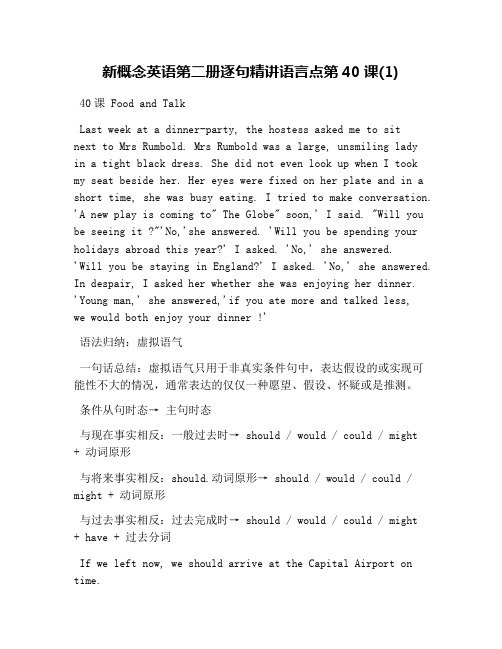
新概念英语第二册逐句精讲语言点第40课(1)40课 Food and TalkLast week at a dinner-party, the hostess asked me to sitnext to Mrs Rumbold. Mrs Rumbold was a large, unsmiling ladyin a tight black dress. She did not even look up when I took my seat beside her. Her eyes were fixed on her plate and in a short time, she was busy eating. I tried to make conversation. 'A new play is coming to" The Globe" soon,' I said. "Will you be seeing it ?"'No,'she answered. 'Will you be spending your holidays abroad this year?' I asked. 'No,' she answered.'Will you be staying in England?' I asked. 'No,' she answered. In despair, I asked her whether she was enjoying her dinner.'Young man,' she answered,'if you ate more and talked less,we would both enjoy your dinner !'语法归纳:虚拟语气一句话总结:虚拟语气只用于非真实条件句中,表达假设的或实现可能性不大的情况,通常表达的仅仅一种愿望、假设、怀疑或是推测。
新概念英语第二册第40课课件
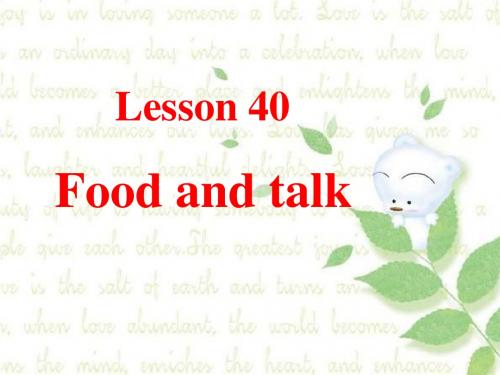
对将来的愿望
对过去的愿望
would/ might/ could+动词原形
过去完成时
I wish (that) I were a bird. I wish (that) I could fly.
I wish (that) I had forgotten it.
2.用于表示命令、建议、要求等一类词后面的宾语从句。 insist, order, command, suggest, advise, propose, require, request, demand, decide 等 We suggested that the meeting (should) be put off. They insisted that the boy (should) go with them. 注意:suggest 当表示“暗示、表明“讲时,insist 表示”坚持认为“之意时,应用陈述语气。 The smile on his face suggested that he was satisfied with our work.
想迫使对方做出明确答复时,将来进行时可以 显得比一般将来时will更委婉客气。
3. Last week at a dinner party, the hostess asked me to sit next to Mrs. Rumbold. 介词at通常用于小型集体活动之前,比较大型的活动会用介词in。 at a meeting(在会议上);at a concert(在音乐会上);at a wedding(在婚礼上)等等。 4. Mrs. Rumbold was a large, unsmiling lady in a tight black dress. unsmiling的反义词是smiling(微笑的,喜气洋洋的)。有些形容 词前面可以加上前缀un-l来表示相反的意思,比如: comfortable-uncomfortable;true-untrue;interesting- uninteresting等等。 5. She did not even look up when I took my seat beside her. Take a seat和take one’s seat都表示“让某人坐下”,这种用 法要比sit down更加正式。 by/beside是贴近的旁边;而near是有一段距离的附近。所以,句 子中的beside可以用by互换
新概念英语第二册:第40课课文详解及语法解析复习过程

新概念英语第二册:第40课课文详解及语法解析新概念英语第二册:第40课课文详解及语法解析课文详注 Further notes on the text1.next to, 挨着。
它既能够表示座位挨着也能够表示地理位置上挨着:Who was the man sitting next to you during the meeting?开会时坐在你旁边的那人是谁?There's a field/shop next to our house.我们家房子边上有一片田野/一个商店。
2.Mrs. Rumbold was a large, unsmiling lady in a tight black dress.兰伯尔德夫人是一位身材高大、表情严肃的女人,穿一件紧身的黑衣服。
(1)unsmiling的反义词为smiling(微笑的,喜气洋洋的)。
有些形容词前面能够加上前缀un-来表示相反的意义:comfortable (舒服的)/uncomfortable(不舒服的),true(真实的)/untrue(不真实的),interesting(有趣的)/uninteresting(无趣味的,乏味的)。
(2)in在这里表示“穿着”、“戴着”:A young man in a blue dress is inquiring for you.有位穿蓝衣服的小伙子在找您。
3.take one's seat, 在指定的位置上就座。
take a seat表示“坐下”,比sit要正式:Please take a seat.请坐。
take one's seat则表示位置事先已安排好:After everyone had taken his seat, the meeting/dinner party began.大家各自就座后,会议/宴会便开始了。
4.Her eyes were fixed on her plate and in a short time, she was busy eating. 她的眼睛盯着自己的盘子,不一会儿就忙着吃起来了。
新概念英语第二册第四十课
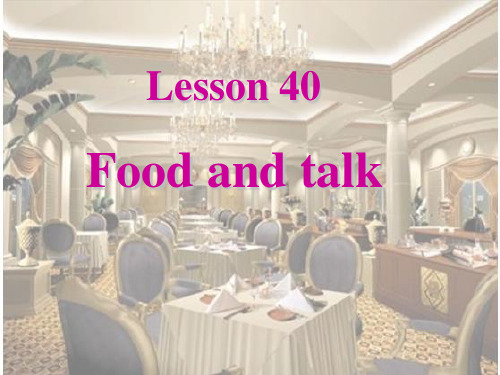
make noise/mistakes/trouble try to do 设法/尽力做某事 try doing 试着做某事 Will you be seeing it?用将来进行时提问,尤其是提出 问题但又不想迫使对方作出明确答复时,将来进行 时可以显得比一般将来时will更委婉客气
In despair, I asked her whether she was enjoying her dinner. 'Young man,' she answered, 'if you ate more and talked less, we would both enjoy our dinner!" • 他在绝望中放弃了这种尝试 • He gave up the attempt in despair • despair: 普通用词,指因灾难等因素而丧失希望和信 心,陷入沮丧,绝望的境地。 • desperation: 语气强烈,指因绝望而使人采取无所顾 忌的疯狂行动。 • depression: 侧重指因遭受重大失利或挫折而产生的低 落情绪。 • disappointment: 多指愿望或期望的落空。
虚拟语气
虚拟语气用法详解虚拟语气:
语气就是我们常说的说话人说话的口气。在汉语中,语气是由说话人说 话的语调、情节等等表现出来的,动词没有任何变化。而在英语中,除 了语调之外,最主要的是动词发生变化而表示不同的语气。在英语中语 气分为三类:陈述语气、祈使语气、虚拟语气。虚拟语气:如果我们所 说的不是事实,也不是要求、命令、劝告等,而只是一种假设、愿望、 建议或是一种实现不了的空想就用虚拟语气。
ask sb to do sth祈使句
next to : 与......相邻 / sit next to me 坐我旁边
新概念英语第二册Lesson40foodandtalk课件
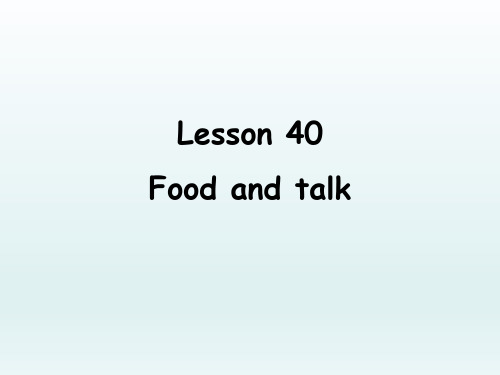
‘In despair, I asked her whether she was enjoying her dinner.’ 7. in despair 失望
Focus on grammar
1. If you park your car in the wrong place, a traffic policeman will soon find it.
句则推测想象的结果。 与现在事实相反的虚拟条件句 结构: if从句------一般过去时(be用were) 主句-------过去将来时(would/could/might/should+do) eg: If you ate more and talked less, we would both enjoy our dinner. If I were you, I would not go to the party.
overcoat.
A. But
B. Although C. How
D. What
Fill in the blanks 1
Food and talk Last week at a dinner party, the _h_o_s_te_s_s___ asked me to sit next to Mrs. Rumbold. Mrs. Rumbold was a large, _u_n_s_m_il_in_g__ lady in a __t_ig_h_t__ black dress. She did not even look up when I took my seat beside her. Her eyes were __f_ix_e_d__on her plate and in a short time, she was busy eating. I tried to make conversation. 'A new play is coming to "The __G_lo_b_e__" soon,' I said. 'Will you be seeing it?' 'No,' she answered. 'Will you be spending your holidays abroad this year?' I asked 'No,' she answered. 'Will you be staying in England?' I asked. 'No,' she answered. In _d_e_s_p_ai_r_, I asked her whether she was enjoying her dinner. 'Young man,' she answered, “if you ate more and talked less, we would both enjoy our dinner!"
新概念第二册40
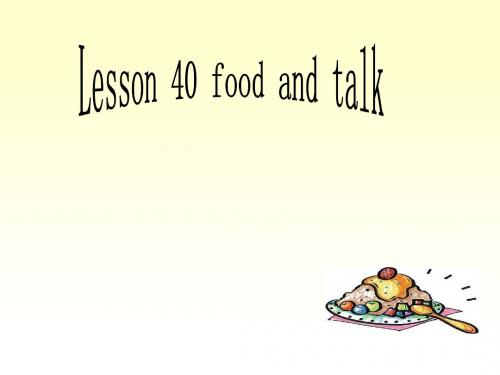
2、表示与过去事实相反的情况
从句:If 主语+had+done 主句:主语+should/would/could/might+have done
eg: 1). If I had got there earlier,I should/could have met her. 如果我早到那儿,我就会见到她。 (事实:去晚了)
5.Was Mrs. Rumbold a good companion at dinner? 6.What did Mrs. Rumbold say to the writer when he asked her if she was enjoying her dinner? 7.Who is impolite?
What is he doing now?
make the bed
make a birthday cake
do chores do housework
do the dishes
do some cleaning
do some reading
do exercises
do the laundry
Beside your napkin you will find a small bread roll and three glasses—one for the white wine, one for the red wine, and one for the water. There are two pairs of knives and forks on the table, forks on the left and knives on the right of the plate. When you see two spoons, the big one is for the soup and the small one for the dessert. When you sit down at the table, you can take your napkin, unfold it and put it on lap.
新概念英语第二册第40课课件

Glass touch/finish No glass touch/take a sip
Listen and answer questions
1.Where did the writer sit at the dinner party?
The writer was sitting next to Mrs.Rumbold.
坐在我旁边的那个男人喝太多
They sang songs by the
campfire. 他们围着篝火在唱歌.
2.Her eyes were fixed on her plate and in a short time, she was busy eating.
be busy with sth 忙于某事 be busy doing sth 忙于做某事 be careful with sth 小心某事 be careful doing sth 小心做某事
新概念英语第二册第40课课件新概念第二册课件新概念英语第二册新概念英语第二册1新概念英语第二册32新概念英语第二册31新概念英语第二册58新概念英语第二册81新概念英语第二册23新概念英语第二册76
新概念英语第二册第40课课件
Lesson 40
Food and talk
appetizer
soup
do a) 可以用来代替一些常用动词如 paint,study,wash,tidy,clean,comb,brush等,意思必须根据上下文 内容和它的宾语来决定:
do the room do the dishes do one’s hair do one’s nails do one’s teeth do one’s best do one’s duty do sb a favour do odd jobs do business do a painting/portrait
新概念第二册Lesson 40 Food and talk讲义
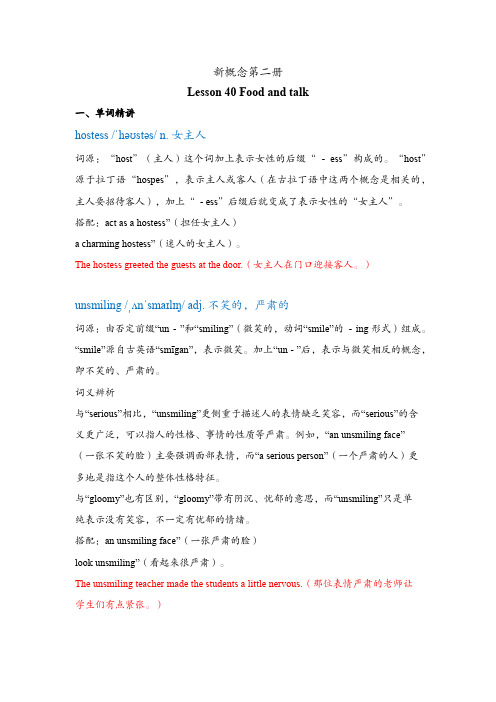
新概念第二册Lesson 40 Food and talk一、单词精讲hostess /ˈhəʊstəs/n.女主人词源:“host”(主人)这个词加上表示女性的后缀“-ess”构成的。
“host”源于拉丁语“hospes”,表示主人或客人(在古拉丁语中这两个概念是相关的,主人要招待客人),加上“- ess”后缀后就变成了表示女性的“女主人”。
搭配:act as a hostess”(担任女主人)a charming hostess”(迷人的女主人)。
The hostess greeted the guests at the door.(女主人在门口迎接客人。
)unsmiling /ˌʌnˈsmaɪlɪŋ/adj.不笑的,严肃的词源:由否定前缀“un - ”和“smiling”(微笑的,动词“smile”的- ing形式)组成。
“smile”源自古英语“smīgan”,表示微笑。
加上“un - ”后,表示与微笑相反的概念,即不笑的、严肃的。
词义辨析与“serious”相比,“unsmiling”更侧重于描述人的表情缺乏笑容,而“serious”的含义更广泛,可以指人的性格、事情的性质等严肃。
例如,“an unsmiling face”(一张不笑的脸)主要强调面部表情,而“a serious person”(一个严肃的人)更多地是指这个人的整体性格特征。
与“gloomy”也有区别,“gloomy”带有阴沉、忧郁的意思,而“unsmiling”只是单纯表示没有笑容,不一定有忧郁的情绪。
搭配:an unsmiling face”(一张严肃的脸)look unsmiling”(看起来很严肃)。
The unsmiling teacher made the students a little nervous.(那位表情严肃的老师让学生们有点紧张。
)tight /taɪt/adj.紧身的辨析:与“narrow”不同,“narrow”主要指宽度上狭窄,而“tight”侧重于物体对身体或其他物体的包裹程度紧。
新概念英语第二册:第40课课文详解及语法解析
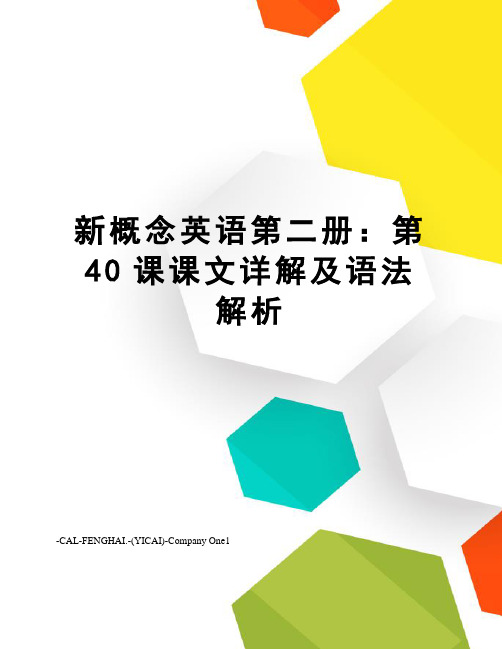
新概念英语第二册:第40课课文详解及语法解析-CAL-FENGHAI.-(YICAI)-Company One1新概念英语第二册:第40课课文详解及语法解析课文详注 Further notes on the text1.next to, 挨着。
它既能够表示座位挨着也能够表示地理位置上挨着:Who was the man sitting next to you during the meeting?开会时坐在你旁边的那人是谁?There's a field/shop next to our house.我们家房子边上有一片田野/一个商店。
2.Mrs. Rumbold was a large, unsmiling lady in a tight black dress.兰伯尔德夫人是一位身材高大、表情严肃的女人,穿一件紧身的黑衣服。
(1)unsmiling的反义词为smiling(微笑的,喜气洋洋的)。
有些形容词前面能够加上前缀un-来表示相反的意义:comfortable (舒服的)/uncomfortable(不舒服的),true(真实的)/untrue(不真实的),interesting(有趣的)/uninteresting(无趣味的,乏味的)。
(2)in在这里表示“穿着”、“戴着”:A young man in a blue dress is inquiring for you.有位穿蓝衣服的小伙子在找您。
3.take one's seat, 在指定的位置上就座。
take a seat表示“坐下”,比sit要正式:Please take a seat.请坐。
take one's seat则表示位置事先已安排好:After everyone had taken his seat, the meeting/dinner party began.大家各自就座后,会议/宴会便开始了。
新概念英语第2册重点内容Lesson40~42(最新)
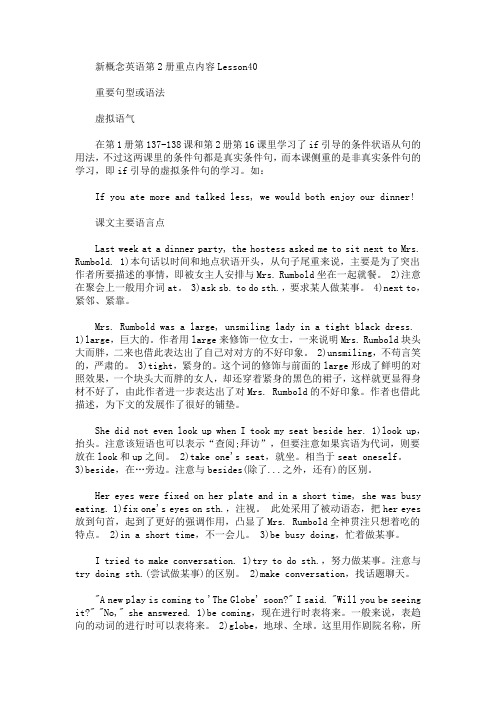
新概念英语第2册重点内容Lesson40重要句型或语法虚拟语气在第1册第137-138课和第2册第16课里学习了if引导的条件状语从句的用法,不过这两课里的条件句都是真实条件句,而本课侧重的是非真实条件句的学习,即if引导的虚拟条件句的学习。
如:If you ate more and talked less, we would both enjoy our dinner!课文主要语言点Last week at a dinner party, the hostess asked me to sit next to Mrs. Rumbold. 1)本句话以时间和地点状语开头,从句子尾重来说,主要是为了突出作者所要描述的事情,即被女主人安排与Mrs. Rumbold坐在一起就餐。
2)注意在聚会上一般用介词at。
3)ask sb. to do sth.,要求某人做某事。
4)next to,紧邻、紧靠。
Mrs. Rumbold was a large, unsmiling lady in a tight black dress.1)large,巨大的。
作者用large来修饰一位女士,一来说明Mrs. Rumbold块头大而胖,二来也借此表达出了自己对对方的不好印象。
2)unsmiling,不苟言笑的,严肃的。
3)tight,紧身的。
这个词的修饰与前面的large形成了鲜明的对照效果,一个块头大而胖的女人,却还穿着紧身的黑色的裙子,这样就更显得身材不好了,由此作者进一步表达出了对Mrs. Rumbold的不好印象。
作者也借此描述,为下文的发展作了很好的铺垫。
She did not even look up when I took my seat beside her. 1)look up,抬头。
注意该短语也可以表示“查阅;拜访”,但要注意如果宾语为代词,则要放在look和up之间。
2)take one's seat,就坐。
新概念英语第二册第40课课件剖析讲解
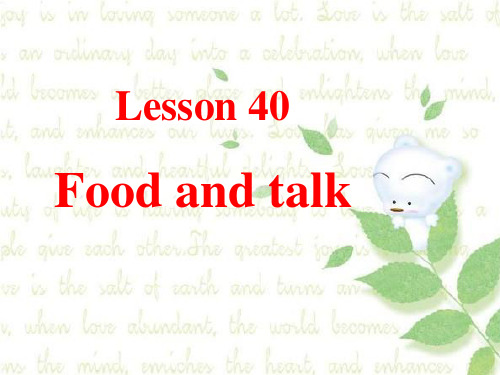
虚拟语气
虚拟语气的概念
• 虚拟语气只用于非真实条 件句中,表达假设的或实 现可能性不大的情况,通 常表达的只是一种愿望、 假设、怀疑或是推测。
与现在 事实相 反的假 设
一、虚拟语气在条件句中
条件从句
主句
If+主语+动词的过去式 (动词be用were)
主语+should/would/ Might/could+动词 原形
5. She did not even look up when I took my seat beside her. Take a seat和take one’s seat都表示“让某人坐下”,这种用 法要比sit down更加正式。 by/beside是贴近的旁边;而near是有一段距离的附近。所以,句 子中的beside可以用by互换
原形
eg:If I had time, I would attend the meeting. If he had hurried ,he could have caught the train. If I were to go abroad ,I would go to America. More practice: 如果我是你,我就会努力学习.
同时,I asked her whether she was enjoying her dinner.也是我 们上节课所讲到的“间接引语”的语法。
7. ‘Young man,’ she answered, ‘if you ate more and talked less, we would both enjoy our dinner!’
ask sb. to do sth.
They sang songs by the campfire. 他们围着篝火在唱歌.
新概念第二册lesson40

注意阅读速度和准确性,提高阅 读理解能力。
写作训练:摘要写作、命题作文
根据所给文章或主题,进行摘要写作 或命题作文练习。
可以多次修改和完善作文,提高写作 水平。
注意文章结构、语法和表达方式,尽 量使用高级词汇和句型。
06
文化背景知识拓展与讨论
相关文化背景介绍
19世纪英国社会风貌
本文所描述的故事发生在19世纪的英国,当时社会等级森严,人们的行为举止都受到 严格的规范。
修辞手法和表达技巧
修辞手法
文章运用了举例、对比等修辞手 法,使文章更加生动有力。
表达技巧
文章使用客观中性的语言,避免 主观色彩和情感倾向,同时运用 专业术语和概念,使表达更加准 确和严谨。
03
词汇短语归纳与拓展
重点词汇梳理及用法举例
词汇1
用法举例: 句子1,句 子2
用法举例: 句子1,句 子2
同义词、近义词辨析
同义词/近义词:词1,词2
辨析:解释词1和词2的区别和联系
04
语法知识点梳理与运用
时态、语态等基本概念回顾
时态
英语中有16种时态,本课主要涉及 一般现在时、一般过去时、现在进行 时、过去进行时等。
语态
英语中有两种语态,即主动语态和被 动语态。本课重点讲解被动语态的构 成及用法。
复合句、并列句等句型结构分析
复合句
本课讲解了复合句的定义、分类及构成方法,包括名词性从 句、定语从句和状语从句等。
并列句
并列句是由并列连词连接的两个或两个以上的简单句。本课 介绍了并列句的常见形式及并列连词的使用方法。
虚拟语气等特殊用法讲解
虚拟语气
本课详细讲解了虚拟语气的定义、用 法及常见形式,包括与现在事实相反 的虚拟语气、与过去事实相反的虚拟 语气和与将来事实相反的虚拟语气等 。
新概念英语 第二册 Lesson 40课文讲解
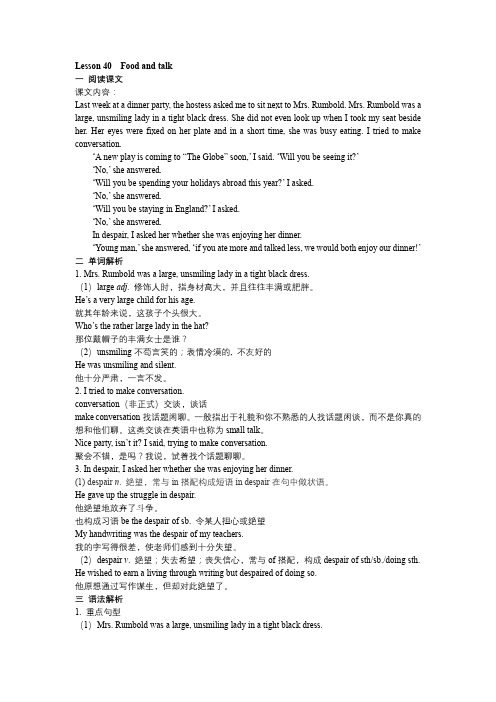
Lesson 40 Food and talk一阅读课文课文内容:Last week at a dinner party, the hostess asked me to sit next to Mrs. Rumbold. Mrs. Rumbold was a large, unsmiling lady in a tight black dress. She did not even look up when I took my seat beside her. Her eyes were fixed on her plate and in a short time, she was busy eating. I tried to make conversation.‘A new play is coming to “The Globe” soon,’ I said. ‘Will you be seeing it?’‘No,’ she answered.‘Will you be spending your holidays abroad this year?’ I asked.‘No,’ she answered.‘Will you be staying in England?’ I asked.‘No,’ she answered.In despair, I asked her whether she was enjoying her dinner.‘Young man,’ she answered, ‘if you ate more and talked less, we would both enjoy our dinner!’二单词解析1. Mrs. Rumbold was a large, unsmiling lady in a tight black dress.(1)large adj. 修饰人时,指身材高大,并且往往丰满或肥胖。
裕兴新概念英语第二册笔记 第四十课 课文讲解
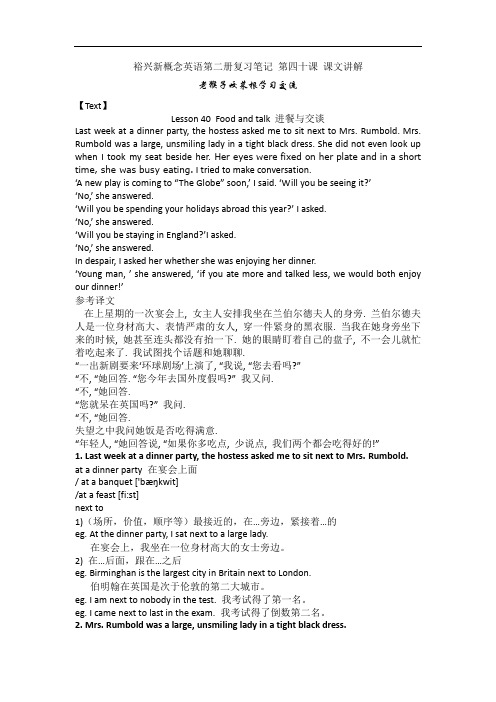
裕兴新概念英语第二册复习笔记第四十课课文讲解老猴子咬菜根学习交流【Text】Lesson 40 Food and talk 进餐与交谈Last week at a dinner party, the hostess asked me to sit next to Mrs. Rumbold. Mrs. Rumbold was a large, unsmiling lady in a tight black dress. She did not even look up when I took my seat beside her. Her eyes were fixed on her plate and in a short time, she was busy eating. I tried to make conversation.‘A new play is coming to “The Globe” soon,’I said. ‘Will you be seeing it?’‘No,’ she answered.‘Will you be spending your holidays abroad this year?’ I asked.‘N o,’ she answered.‘Will you be staying in England?’I asked.‘No,’ she answered.In despair, I asked her whether she was enjoying her dinner.‘Young man, ’ she answered, ‘if you ate more and talked less, we would both enjoy o ur dinner!’参考译文在上星期的一次宴会上, 女主人安排我坐在兰伯尔德夫人的身旁. 兰伯尔德夫人是一位身材高大、表情严肃的女人, 穿一件紧身的黑衣服. 当我在她身旁坐下来的时候, 她甚至连头都没有抬一下. 她的眼睛盯着自己的盘子, 不一会儿就忙着吃起来了. 我试图找个话题和她聊聊.“一出新剧要来‘环球剧场’上演了, “我说, “您去看吗?”“不, “她回答. “您今年去国外度假吗?” 我又问.“不, “她回答.“您就呆在英国吗?” 我问.“不, “她回答.失望之中我问她饭是否吃得满意.“年轻人, “她回答说, “如果你多吃点, 少说点, 我们两个都会吃得好的!”1. Last week at a dinner party, the hostess asked me to sit next to Mrs. Rumbold.at a dinner party 在宴会上面/ at a banquet ['bæŋkwit]/at a feast [fi:st]next to1)(场所,价值,顺序等)最接近的,在…旁边,紧接着…的eg. At the dinner party, I sat next to a large lady.在宴会上,我坐在一位身材高大的女士旁边。
新概念英语第二册第40课课件

新概念英语第二册第40课课件新概念英语第二册第40课课件,包括单词、语法、课文及中考链接试题,很实用。
L40 Food and Talk新概念英语第二册第40课课件,包括单词、语法、课文及中考链接试题,很实用。
复习L39课间接引语与直接引语课间接引语与直接引语复习1.She asked, “Did he go home?” She asked if/whether he had gone home. 2.She asked, “Why did he leave?” She asked why he had left. 3.He asked, “When will she e back?” He asked when she would e back.新概念英语第二册第40课课件,包括单词、语法、课文及中考链接试题,很实用。
Listen and answer questions1.Where did the writer sit at the dinner party? The writer was sitting next to Mrs.Rumbold. 2.How was the conversation between the writer and Mrs.Rumble? The conversation didn’t go very well. 3.Did Mrs.Rumble answer the writer’s question? No,she didn’t.新概念英语第二册第40课课件,包括单词、语法、课文及中考链接试题,很实用。
Food and talkLast week at a dinner party,the hostess asked me to sitnext to Mrs.Rumbold.Mrs.Rumbold was a large, unsmiling lady in a tight black dress. She did not even look up when I took my seat beside her. Her eyes were fixed on her plate and in a short time, she was busy eating.I tried to make conversation.新概念英语第二册第40课课件,包括单词、语法、课文及中考链接试题,很实用。
(完整word版)新概念英语第二册笔记_第40课.doc
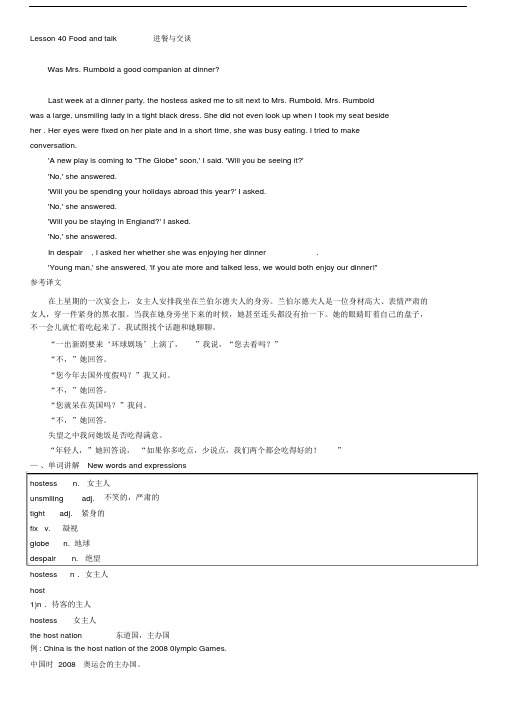
sneer嗤笑,嘲笑, 笑(流露出高人一等, 蔑的表情)
grin[grin]咧着嘴笑, 着牙笑
ridicule ['ridikju:l]嘲弄,嘲笑laugh at
tight
1) adj.的、不松的(反loose)
a tight black dress黑色的 身衣
a tight knot系的很 的
要是你不抓紧的话,你就会错过火车的。
If I have time, I' ll write to him tomorrow.
要是我有时间的话我明天会给他写信的。
Please don't disturb him if he is busy.
要是他忙的话不要打扰他。
2.非真实条件句(虚拟语气)
if
从句谈论想象的情况,主句则推测想象的结果,再从句中要用动词的过去时,主句时
a global tour
球旅行
everybody wishes for global peace.
每个人都渴望全球和平。
globalize
V,使⋯全球化
globalize the economy
使 全球化
globalize the culture
使文化全球化
globalization
n.
全球化
modern adj
These shoes are too tight for me. 些鞋 我来 大太 脚了
His fingers were tight on my arm.他 抓住我的手臂。
a tight schedule凑的日程安排
a tight match均力 的比
或a close match
逐句精讲新概念英语第二册第40课进餐与交谈
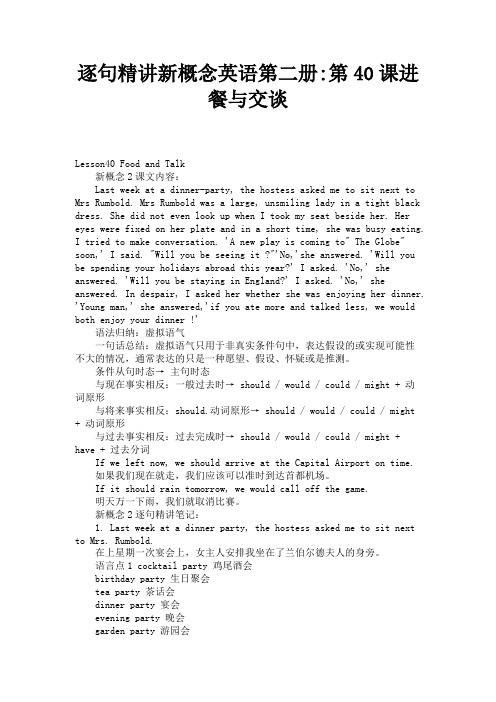
逐句精讲新概念英语第二册:第40课进餐与交谈Lesson40 Food and Talk新概念2课文内容:Last week at a dinner-party, the hostess asked me to sit next to Mrs Rumbold. Mrs Rumbold was a large, unsmiling lady in a tight black dress. She did not even look up when I took my seat beside her. Her eyes were fixed on her plate and in a short time, she was busy eating.I tried to make conversation. 'A new play is coming to" The Globe" soon,' I said. "Will you be seeing it ?"'No,'she answered. 'Will you be spending your holidays abroad this year?' I asked. 'No,' she answered. 'Will you be staying in England?' I asked. 'No,' she answered. In despair, I asked her whether she was enjoying her dinner. 'Young man,' she answered,'if you ate more and talked less, we would both enjoy your dinner !'语法归纳:虚拟语气一句话总结:虚拟语气只用于非真实条件句中,表达假设的或实现可能性不大的情况,通常表达的只是一种愿望、假设、怀疑或是推测。
- 1、下载文档前请自行甄别文档内容的完整性,平台不提供额外的编辑、内容补充、找答案等附加服务。
- 2、"仅部分预览"的文档,不可在线预览部分如存在完整性等问题,可反馈申请退款(可完整预览的文档不适用该条件!)。
- 3、如文档侵犯您的权益,请联系客服反馈,我们会尽快为您处理(人工客服工作时间:9:00-18:30)。
新概念英语第二册:第40课课文详解及语法解析课文详注 Further notes on the text
1.next to, 挨着。
它既能够表示座位挨着也能够表示地理位置上挨着:
Who was the man sitting next to you during the meeting?
开会时坐在你旁边的那人是谁?
There's a field/shop next to our house.
我们家房子边上有一片田野/一个商店。
2.Mrs. Rumbold was a large, unsmiling lady in a tight black dress.兰伯尔德夫人是一位身材高大、表情严肃的女人,穿一件紧身的黑衣服。
(1)unsmiling的反义词为smiling(微笑的,喜气洋洋的)。
有些形容词前面能够加上前缀un-来表示相反的意义:comfortable (舒服的)/uncomfortable(不舒服的),true(真实的)/untrue(不真实的),
interesting(有趣的)/uninteresting(无趣味的,乏味的)。
(2)in在这里表示“穿着”、“戴着”:
A young man in a blue dress is inquiring for you.
有位穿蓝衣服的小伙子在找您。
3.take one's seat, 在指定的位置上就座。
take a seat表示“坐下”,比sit要正式:
Please take a seat.
请坐。
take one's seat则表示位置事先已安排好:
After everyone had taken his seat, the meeting/dinner party began.
大家各自就座后,会议/宴会便开始了。
4.Her eyes were fixed on her plate and in a short time, she was busy eating. 她的眼睛盯着自己的盘子,不一会儿就忙着吃起来了。
(1)fix最常用的意思为“使……固定”、“安装”:
she fixed a handle on the door.
她在门上安了个把手。
fix on的含义之一为“使(目光、注意力等)集中于”、“盯着”:
He fixed his eyes on the book, but he couldn't understand a word.
他的眼睛盯着那本书,但他一个字儿也没看懂。
(2)busy+ doing sth.表示“忙着做某事”, doing前能够加in,也能够不加:
They are busy (in) repairing the car.
他们正忙着修车。
We're all busy getting ready for the performance.
我们都在忙着为演出实行准备。
5.If you ate more and talked less…如果你多吃点,少说点……
在并列句中,相同的句子成分(如主语、谓语、状语等)通常由同一词性的单词/词组表示,并且它们的长度也差不多,以保持句子的平衡性。
在课文中的这句话中ate与talked对应,more与less对应。
再如:
You can either go out or stay here.
你出去也行,呆在这里也行。
He wants to buy a lot of things, but he has little money.
他想买的东西很多,但他的钱很少。
语法 Grammar in use
第2类条件句
在第16课的语法中,我们学习了第1类条件句,它谈论将有可
能发生的事情,并且考虑其将来的真实结果。
它的一般形式如下所
示:
You'll miss the train if you don't hurry.
你如果不抓紧时间会误了火车的。
(主句用一般将来时,从句用
一般现在时或其他形式的现在时)
第2类条件句的形式与第一类不同,if从句中用一般过去时,谈论想像的情况,主句用would +动词原形,推测想像的结果:
If it rained tomorrow, we'd stay at home.
如果明天下雨,我们将呆在家里。
即使第2类条件句使用过去时,却并非指过去的时间,所以,if 之后的过去时用法常被称为“非真实的过去”。
第2类条件句有时能够代替第1类条件句来描述颇有可能发生的事情,但比第1类条件句较为“无把握”。
试比较:
If you went by train,you would get there earlier.
如果你坐火车去。
你或许会早些到那儿。
If you go by train,you will get there earlier.
如果你坐火车去,你就会到得早些。
不过第2类条件句经常用来描写完全不可能的事情:
If I had longer legs, I'd be able to run faster.
如果我的腿再长一点儿,我就能跑得更快了。
在最后一个例句中,the weather是单数,按语法规则,在正常的陈述句中它后面应为was而不是were。
但在第2类条件句中,were 比was更为正式,与真实情况的差别也更大:If
he were/was ready, I would go.
如果他准备好了,我就去。
if I were you这种说法经常用于提出建议:
If I were you, I'd accept their offer.
如果我是你,我就接受他们的建议。
1、Thank you very much for taking me with you on that splendid outing to London. It was the first time that I had
seen the Tower or any of the other famous sights. If I'd gone alone, I couldn't have seen nearly as much, because I
wouldn't have known my way about.The weather was splendid on that day, which I thought was rare. I still
remember some people told me that in Britain there was weather and no climate. During the same day, it might
snow in the morning, rain at noon, shine in the afternoon and be windy before the night falls. So I think I was
lucky。
20.6.156.15.202012:1012:10:56Jun-2012:10
2、最困难的事情就是认识自己。
二〇二〇年六月十五日2020年6月15日星期一
3、有勇气承担命运这才是英雄好汉。
12:106.15.202012:106.15.202012:1012:10:566.15.202012:106.15.2020
4、与肝胆人共事,无字句处读书。
6.15.20206.15.202012:1012:1012:10:5612:10:56
5、阅读使人充实,会谈使人敏捷,写作使人精确。
Monday, June 15, 2020June 20Monday, June 15,
20206/15/2020
6、最大的骄傲于最大的自卑都表示心灵的最软弱无力。
12时10分12时10分15-Jun-206.15.2020
7、志气这东西是能传染的,你能感染着笼罩在你的环境中的精神。
那些在你周围不断向上奋发的人的胜利,会鼓励激发你作更艰
苦的奋斗,以求达到如象他们所做的样子。
20.6.1520.6.1520.6.15。
2020年6月15日星期一二〇二〇年六月十五日。
